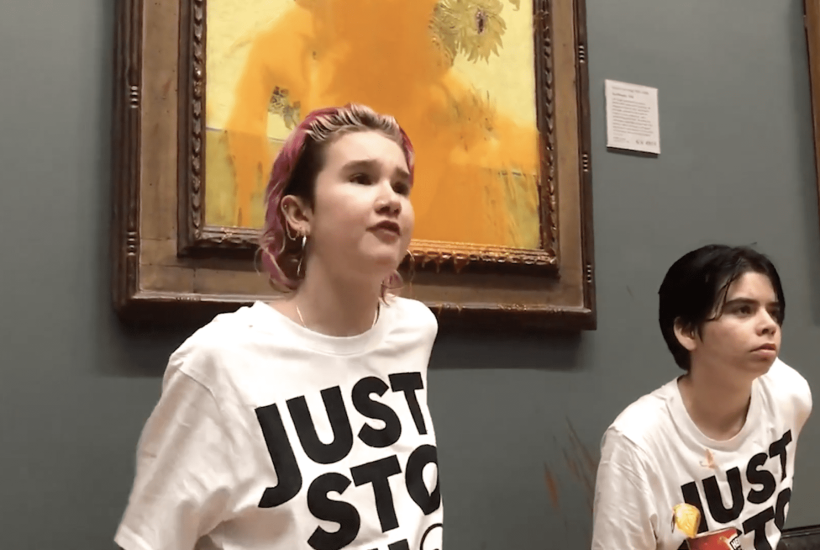The National Gallery is home to Van Gogh’s still life Sunflowers. It’s an oil on canvas that, according to the Times, has been valued at £75 million. It is a cherished work of modern European art and one of the most important to come from the post-impressionist movement. This morning, two activists from Just Stop Oil went into Room 43 of the National Gallery and drenched Sunflowers in Heinz cream of tomato soup, before glueing themselves to the wall.
One of the young women said:
Is art worth more than life? More than food? More than justice? The cost of living crisis is driven by fossil fuels. Everyday life has become unaffordable for millions of cold, hungry families. They can’t even afford to heat a tin of soup. Meanwhile, crops are failing and people are dying in supercharged monsoons, massive wildfires and endless droughts caused by climate breakdown. We can’t afford new oil and gas.
The National Gallery says the painting has not been damaged – high-value works tend to have a plastic film placed over them before going on public display – but there has been ‘some minor damage to the frame’. The Metropolitan police says it has arrested two people on suspicion of criminal damage and aggravated trespass.
You might object to these actions because criminal damage is against the law. You might say this is the wrong way to go about changing public policy on energy and the climate. You might argue that, however noble your cause or sincere your intentions, attempting to deface a landmark work of art to make a political statement only makes the statement that you are an authoritarian brat breaking other people’s toys to get your own way. You might consider souping Sunflowers to be civilisational as well as literal vandalism: an attack on beauty, brilliance, and imagination, an assault even on democratic access to art.
To all of which I say: Van Gogh had it coming. Well, not Van Gogh per se, but us. We had it coming. We have invited this kind of behaviour by indulging it, by treating it as a matter of mere vandalism or damage to property. We do not deter attacks on our great national treasures and so the attacks keep coming.
Shanti Escalante-De Mattei of ARTnews curates a running tally of artworks targeted by climate activists. In June, Just Stop Oil campaigners in Glasgow glued themselves to Horatio McCulloch’s My Heart’s in the Highlands at Kelvingrove Art Gallery. The following day, another Van Gogh, this time Peach Trees in Blossom, was the object of some adhesive protest at the Courtauld Institute in London. Next up was Tomson’s Aeolian Harp by Turner, which is housed in Manchester Art Gallery. A few days after that, Just Stop Oil sympathisers turned up at the National Gallery and first covered Constable’s The Hay Wain with their own climate-dystopian version of the landscape and thereafter glued themselves to the frame. Then it was The Last Supper, by Giampietrino, at the Royal Academy in London.
This is part of a global movement, with anti-oil protestors glueing themselves to artwork in Italy and Germany. True, they glue their hands to the frame of the painting or to the wall, not to the canvas itself. But the potential for something to go wrong and for serious damage to be done is very much present. A slip, a tumble, a splosh of glue and a priceless artefact of the European cultural inheritance could be ruined forever. That is not all, considering the impact these actions have on others wishing to view the artworks, the costs to museums and galleries, and the wasting of police time.
However, those in authority seem very laidback about these incidents, as laidback as when other activists block major roads or smash the windows of newspapers whose coverage they don’t like. The right of protest is a crucial democratic safeguard but it is not inviolate. It does not, for instance, extend to causing criminal damage, blocking major transportation arteries or endangering objects of national culture or heritage. Yet if the legal powers to prevent, disperse or deter these attention-seeking enterprises are not there, it equally does not seem that those in government are in any rush to introduce such powers. I appreciate that ministers have other matters to attend to at present, but it’s hard to shake the feeling that they are not terribly motivated to do anything about this.
Maybe their attention is fixed elsewhere. Maybe they don’t care or are lazy. Maybe they are so cocooned from ordinary life that they don’t grasp how strongly people feel about vandalism of cultural assets. Maybe they’ve never suffered through the delays and other inconveniences caused by direct action. Maybe there are just too many people in Whitehall and Westminster who feel sympathy with Just Stop Oil and Extinction Rebellion, or who are so cowed by the angry idealism of youth or so keen not to find themselves on the accursed ‘wrong side of history’ that they cannot bring themselves to reassert rule by grown-ups.
I am a hand-wringing liberal and don’t like the sentiments these stunts bring out in me, but I suspect I’m not the only person of my political persuasion who has lost all patience with these tantrum-throwing trust-funders. Amend Section 50 of the Police, Crime, Sentencing and Courts Act 2022 to include publicly owned or displayed artworks, or create a specific offence of damaging or attempting to damage objects of cultural, artistic or heritage value. Levy sizeable fines and bar outside activist organisations, especially those headquartered overseas, from meeting legal costs in cases like these. Damaging or destroying a work of art that is meant for public enjoyment, especially one displayed in a publicly-subsidised gallery, is an anti-social act that shows contempt for others and for the public purse. Legislate to prohibit those convicted of such an offence from employment in the public sector or a publicly-funded role, or from receiving research council funding, for a set number of years after conviction. Similarly robust measures could be targeted at road-blockers, too.
Unless, that is, we’re just fine with this sort of thing now. The ease with which activists of all stripes and hair colours are able to capture institutions hints that we might be, as does the collapse in confidence across that stratum of public life that used to be known as authority. Those meant to uphold order appear either not to care or to harbour sympathy for the disruptors. When a country becomes this ungovernable, when the governors are this inadequate or squeamish about their responsibilities, it invites incidents like this morning. If this is the kind of country we are now, we can hardly complain about a couple of hothead radicals chucking tomato soup over a painting. We’re practically handing them the tin-opener.
Got something to add? Join the discussion and comment below.
Get 10 issues for just $10
Subscribe to The Spectator Australia today for the next 10 magazine issues, plus full online access, for just $10.




















Comments
Don't miss out
Join the conversation with other Spectator Australia readers. Subscribe to leave a comment.
SUBSCRIBEAlready a subscriber? Log in